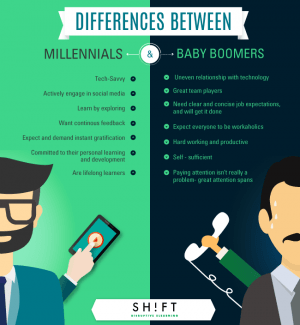“Bottom-line: Your eLearning courses should be millennial-friendly!” ..Karla Gutierrez, Inbound Marketer @Aura Interactiva, the developers of SHIFT.
Corporate training continues to be perceived as an activity which enhances the performance of employees and equip them with skills and imparts knowledge into them. The past two articles have identified the trend or history of corporate training within the past century which has evolved significantly over the period.
In this concluding article, we shall examine the modern training needs of Millennials against the “Baby Boomers”, which corporate Trainers need to appreciate to satisfy their insatiable thirst for regular knowledge sharing to fill up the growing need for agile employees for the industries in the Fourth Industrial Revolution, supported by artificial intelligence and machine learning.

- Last week’s article listed the new trends in corporate training in a post-covid era, and the above diagram shows some of the basis for the change. Employees in the corporate world continue to change consistently in favour of Millenials. In effect, the working population dynamics continues to affect the nature of training to adopt.
- The above diagram gives a general perception of the characteristics of Millennials and Baby Boomers, which corporate trainers can never overlook or take for granted. John Findlay, co-founder of LemonadeLXP, a learning experience and digital adoption platform in his article of 12th July, 2021: “ 4 Ways COVID-19 Transformed Training For the Better”, the Millennials are set to become the biggest workforcein the United States by 2025. They will make up 75 percent of the workforce, which is more than 50 million.
Corporate Training Tips to Adopt to Satisfy the Increasing Numbers of the Millennials:
- They are tech-savvy and always online, so they have to be constantly engaged – no more downloading of boring power-points.
- They prefer material that is current, relevant and of immediate use to them. They immediately put on their binoculars to assess your content and give immediate feedback, due to their need for “instant gratification”. I have witnessed several trainees quickly go online to confirm certain information right in front of a Facilitator. One has to be confident and smart in front of such participants, to avoid embarrassment.
- They want effective e-learning courses that ,should provide feedback to learners regularly about their progress, what they have mastered, and if they have met certain goals. Providing continuous SMARTfeedback will motivate learners as they progress through the course. Corporate Trainers will be assessed by these learners and their continuous employment will be based on their recommendations.
- Their eagerness to climb up the employment ladder is very huge, and they also have a habit of life-long learning, so they can move up the corporate ladder quickly. Corporate trainers need to accelerate the speed of training, and their courses should therefore be more regular and up to date.
- Millennials change jobs very easily, sometimes every three years. As employers are being forced to cater to the demands of young Millennials, there should be more training opportunities to nurture their talents and build marketable skills that will help them advance their careers within the organization. For example, for Accountants’ or other Specialist courses, I recommend that Trainers infuse supervisory skills, marketing and relationship building skills. There should be a lot of interaction, simulations, role plays and syndications.
- Corporate Trainers should move to a more rapid operational learning, relevant to just what they are doing on the job. The e-learning micro-learning structure enables them listen or watch the programs at their own time, suited to the work demands.
- A Blended Learningmethodology combines live virtual classrooms, led by expert instructors, and self-paced learning modules. Such platforms should also provide learners with hands-on labs and projects, requiring them to put the skills learned throughout their course into practical use, improving knowledge retention. Blended Learning methodology also makes online education more effective in that it offers learners the support and guidance of both instructors and mentors.
- With the increased adoption of Microlearning, in the post-pandemic world, learners will continue to take charge of their corporate learning experiences. But the learning needs to be accessible for them to take at their convenience. For the operational learning, trainees now prefer small bits of learning things they can quickly internalize and apply on the job.
- The online delivery (Zoom or Microsoft Teams) should involve frequent Questions and Answers, Break-out sessions for participants to discuss among themselves and bond, gamification, play quizzes in real-time, and regular breaks for stretching.
- Gamification is the process of adding game-like elements to things that typically aren’t considered “games”. In the case of corporate training, gamification adds points, badges, and other game features to otherwise traditional training courses and modules, giving people a new way to learn.
- The game should translate to the workplace and not distract the learner from productivity. It should relate to your specific business goals. Gamification has proven to be a great tool for engaging audiences in different areas. In more conservative industries, like banking, gamification has met with some skepticism. It actually gets gets results from the trainees. However, please don’t overdo it! Gamification can be taken too far and ultimately do more harm than good.
Final Remarks
We, as Corporate Trainers need to sit up and transform corporate training to keep up with the demands of the business. A few years ago, some organizations took the digital transformation casually, but the pandemic has made it an urgent need. Going forward, corporate learning will be more about sharing the best means to keep employees updated and learing best practices, to ensure learners know about lessons learned, and avoid re-inventing the wheel.
Are we ready to stay in the game? Are we prepared to roll out corporate training that matters to our learners and improves their performance? Can we use virtual instructor-led training that replicates the real classroom virtually? Let us go back to school to use the modern technological tools to share our knowledge before our participants learn the hard way through BIG mistakes on the job.
ABOUT THE AUTHOR
Alberta Quarcoopome is a Fellow of the Institute of Bankers, and CEO of ALKAN Business Consult Ltd. She is the Author of Three books: “The 21st Century Bank Teller: A Strategic Partner” and “My Front Desk Experience: A Young Banker’s Story” and “The Modern Branch Manager’s Companion”. She uses her experience and practical case studies, training young bankers in operational risk management, sales, customer service, banking operations and fraud.
CONTACT
Website www.alkanbiz.com
Email:alberta@alkanbiz.com or [email protected]
Tel: +233-0244333051/+233-0244611343










